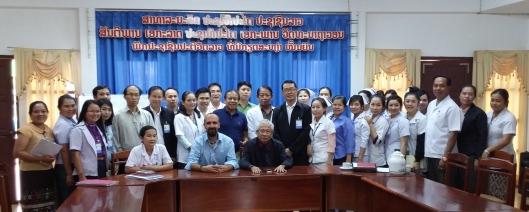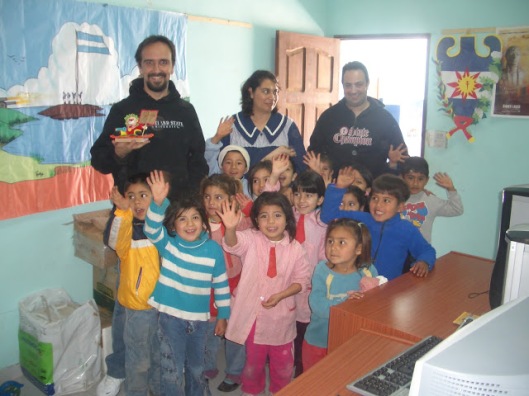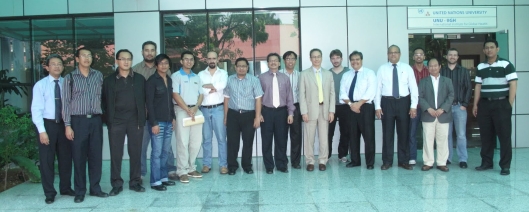Update: Last year (May 2018), the FSF asked me to write a post about GNU Health. Finally, here it is !
May 2018

Health is a non-negotiable human right. Access to quality healthcare must be public and universal.
I am back from my trip to India, where I spent a week with the team of All India Institute of Medical Sciences – AIIMS –, the largest public hospital in Asia and a leading research institution. They have taken the decision to adopt GNU Health, the Free Hospital and Health Information System.
One key aspect in Free Software is ownership. From the moment they adopted GNU Health, it now also belongs to AIIMS. They have full control over it. They can download and upgrade the system; access the source code; customize it to fit their needs; and contribute back to the community. This is the definition of Free Software.
The definition of Free Software is universal. GNU Health is equally valid for very large institutions, national public health networks and small, rural or primary care centers. The essence is the same.
GNU Health as a social movement: GNU Health is a social project with technology behind. It’s about Social Medicine and delivering universal healthcare. It’s about social activism. One of the main reasons that led me to create GNU Health were the tremendous inequalities in access to healthcare. Over 20000 children die every day from preventable, social diseases. To name a few : malnutrition, contaminated water, child slavery, prostitution, war, malaria, HIV-AIDS, tuberculosis, dengue and other neglected tropical diseases. These are causes and/or results of social diseases, conditions that have a higher impact and higher prevalence on the poor and the underprivileged.
Studying and getting a deeper understanding on the living conditions of people in rural areas and in urban ghettos around the world, reinforced my intention to write a system that included the socio-economic determinants of health and disease. Most of the time, health (and the lack of) is determined by the environment, and biology plays a lesser role. Proper nutrition, housing, sanitation, access to education and to primary healthcare are key for the dignity, development and health of the individual, family and society at large. I like to summarize it as “people before patients”.

GNU Health implementation at Laos CMR Public Health hospital (CC BY-SA 4.0 GNU Solidario )
Nature and Nurture: Having Social Medicine on its DNA does not stop GNU Health from also working on the molecular basis of health and disease, precision medicine, bioinformatics and genetics. For instance, we incorporate state-of-the-art information from Unitprot containing thousands of gene natural variants involved in human disease. The bio-psycho-social GNU Health approach makes personalized medicine possible, and it builds the bridge between the clinician and the research institution, to better understand and fight multifactorial conditions such as Alzheimer’s disease or cancer. Both nature and nurture are present in GNU Health.

GNU Health – Freedom and Equity in Healthcare
Trans-disciplinary team: GNU Health works at different levels. Social workers doing prevention in the field; health professionals taking care of the patients; Administrative team dealing with stock, human resources, finances and other internal health institution processes; and the ministry of health improving health campaigns based on the collected data. All these processes and tasks are interconnected, and the result of others.
The fight for Public Health System: I am observing how many countries are dismantling the Public Health system in favor of private corporations. This is not only sad, it is a crime. The only way we can guarantee proper and universal health care is by maintaining the Public Health system. Privatization of the public healthcare is evil, creates a health system for the rich, and excludes the underprivileged that can not afford insurance costs. Let me be very clear: healthcare is just a business for the corporation. Dr. René Favaloro said “Medicine without humanism is unworthy of being practiced”. I am not against the small private doctor office, that is complementary to the public health system. I am condemning the destruction of the current public health system, and putting it on the hands of large corporations that only care about money.

GNU Solidario first project. Santiago del Estero 2006 . (CC BY-SA 4.0 Luis Falcon)
Public Health is a public good, so, as a result, anything related to public health should also be public. It is a contradiction to have proprietary software running in the public health system. Not only is contradictory and unethical, it poses many dangers to privacy and security of the individual health information. Private software is a black box. We don’t know what happens when a medical evaluation is recorded. Where else does this data go? Who can access it ? We simply don’t know, because we can not see the code behind the action.

Children in a Cameroon rural school (2018 CC BY-SA 4.0 Luis Falcon)
Collective Freedom and ethical software: Free software is a philosophy based on community, cooperation and solidarity. We all benefit from the work, effort and talent of others. GNU Health uses many Free Software (operating systems, programming languages, database engines, encryption libraries, etc.). Moreover, GNU Health is today the result of the contribution of many people and institutions. We must be grateful to the community, and make sure that nobody breaks the evolution chain. This is where the concept I call “collective freedom” comes into play. People or companies that take the work of others, and purposely make it non-free are breaking the chain of evolution. They have taken advantage of the good will from the community to lock-in them in. Purposely obfuscating the code, not providing upgrade scripts, hiding documentation are ways violating the “collective freedom” and making a system non-ethical. That is one of the reasons we differentiate between Free Software philosophy, which is ethical by definition, from “Open Source”, that has a more pragmatic approach to programming. Richard Stallman wrote an article “When Free Software depends on nonfree” (https://www.gnu.org/philosophy/when-free-depends-on-nonfree) , related to this concept. For Spanish speakers, you can read my article “El Software Libre no se Mancha” (http://www.rebelion.org/noticia.php?id=233717 ), also related to this concept of Collective Freedom.
Ten years of Freedom and Equity in Healthcare: During this 10-year period, we have seen GNU Health adopted in many different scenarios: Primary care centers and academic institutions in Argentina; in the tropical rainforest of Cameroon; Infectious diseases laboratory in Gabon; the eHealth system in Jamaica Ministry of Public Health; The Center for Physical Rehabilitation in Laos taking care of UXO victims; Red Cross hospitals in Mexico or the largest public hospital in India and Asia. They are all different contexts and peculiarities, yet they all share the same spirit, that is, delivering Freedom and Equity in healthcare to the people.

GNU Health at the United Nations – International Institute for Global Health
Let’s celebrate this 10 years of GNU Health, a social movement with technology behind. Let’s keep on fighting for health to be a non-negotiable human right.

You must be logged in to post a comment.